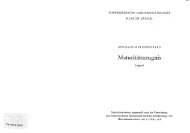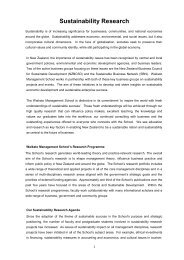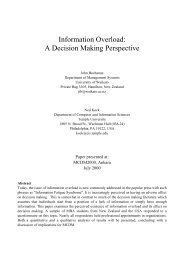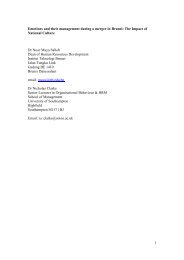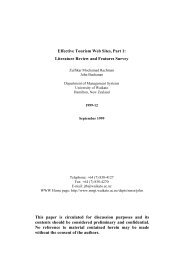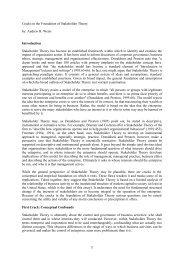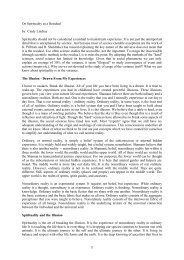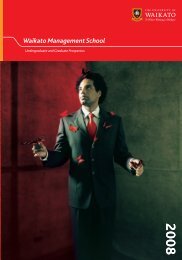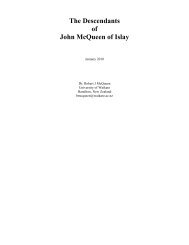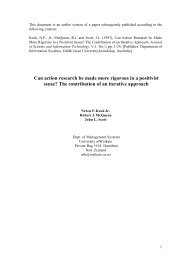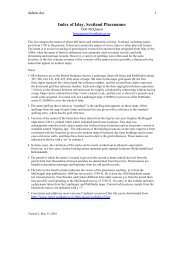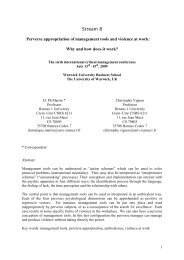2009 Undergraduate & Graduate Prospectus - PDF - Waikato ...
2009 Undergraduate & Graduate Prospectus - PDF - Waikato ...
2009 Undergraduate & Graduate Prospectus - PDF - Waikato ...
Create successful ePaper yourself
Turn your PDF publications into a flip-book with our unique Google optimized e-Paper software.
Our goal is for students to graduate with<br />
> A thorough understanding of communication theory and<br />
practice, coupled with general communication expertise.<br />
> Specialist knowledge in at least one or two of the<br />
following areas: Public Relations, Marketing,<br />
Management Communication, Linguistics, Media studies,<br />
English studies, Māori Media and Communication and<br />
are able to apply that knowledge in a professional<br />
communication context.<br />
> The ability to analyse and critique communication and<br />
design communication solutions in a variety of social and<br />
professional contexts.<br />
Admission<br />
'How to get into <strong>Waikato</strong>' on page 76 provides details about<br />
the various ways to gain admission.<br />
Requirements<br />
Further information on specific rules and requirements for<br />
papers, majors, and the degree, can be found in the WMS<br />
Student Handbook and the University of <strong>Waikato</strong> Calendar,<br />
which are available online at<br />
www.management.ac.nz/publications and<br />
http://calendar.waikato.ac.nz/ respectively.<br />
Planning your first year<br />
SEAMUS MARTEN<br />
BCS, GRADDip SPORT AND LEISURE STUDIES<br />
Head of Competitions, Oceania Football<br />
“If someone had told me I’d be working at the world’s biggest sporting event – the FIFA World Cup – less than<br />
two years after graduating, I’d have laughed at them, but that’s what I’ve done.<br />
I travel through the Pacific Islands to organise and implement the various tournaments and competitions<br />
in the Oceania Football Confederation portfolio. While I have an affinity with Pacific Island people and a<br />
passion for football, the experience gained through groupwork<br />
in the BCS founded my knowledge of inter-cultural<br />
communication. I came out of uni confident and ready to<br />
use my PR and marketing skills in a sporting context.<br />
Inter-cultural communication and diversity are what drives<br />
me. FIFA has a truly global staff; I’ve met good mates<br />
through my travel to the Islands, Canada, Germany and<br />
Switzerland, and I’ve grown as a person. I’m humbled by the<br />
opportunities I’ve had so far and I’m looking forward to a<br />
future with either a professional sports franchise or further<br />
work with football in Oceania.”<br />
First year compulsory papers<br />
LING132 The Use of Language<br />
This paper introduces that branch of Linguistics which<br />
examines the way in which language is used as an expression<br />
of a speaker’s culture and social group, and considers how<br />
language varies according to social context.<br />
MCOM102 Communication and Cyberspace<br />
This paper introduces students to critical communication<br />
competencies, concepts and issues that they are likely<br />
to encounter during the course of their lives as citizens,<br />
communication professionals, community members and atlarge<br />
participants in our highly mediated world. It does so by<br />
using the broad theme of ‘communication and cyberspace’ to<br />
revisit age-old problems involved in developing thoughtful,<br />
effective, ethical and socially significant communication<br />
practices and skills.<br />
Note: Students who have gained 14 credits at Level 3 in<br />
NCEA Classical Studies (including achievement standard 3.3),<br />
English, History (including achievement standard 3.5), or<br />
Te Reo Māori may enrol directly in this paper. Students who<br />
have not met this requirement must take MCOM104, MAOR111,<br />
ESLA101 or ALED100 as a prerequiste for enrolment.<br />
MCOM133 Introduction to Corporate Communication<br />
This paper provides an introduction to the diverse<br />
functions of corporate communication. It also explores how<br />
important creativity is in making corporate communication<br />
work at all levels.<br />
Note: Students who have gained 14 credits at Level 3 in<br />
NCEA Classical Studies (including achievement standard 3.3),<br />
English, History (including achievement standard 3.5), or<br />
Te Reo Māori may enrol directly in this paper. Students who<br />
have not met this requirement must take MCOM104, MAOR111,<br />
ESLA101 or ALED100 as a prerequiste for enrolment.<br />
53<br />
BACHELOR OF COMMUNICATION STUDIES




